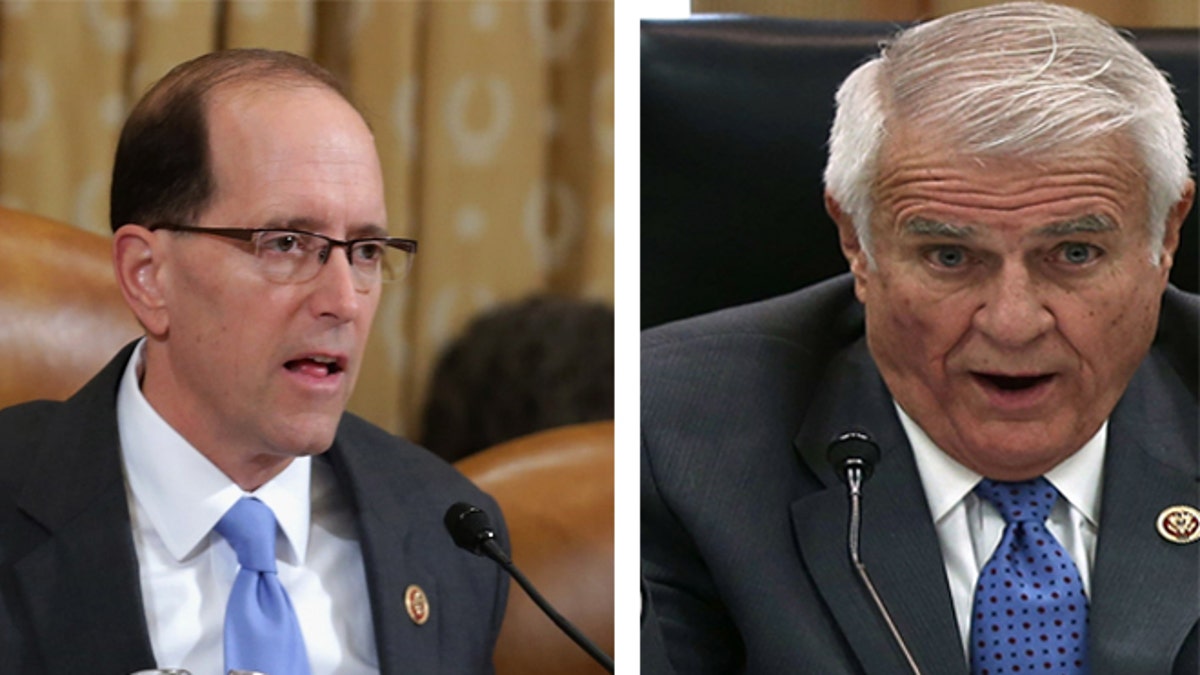
It was to be a bipartisan effort to draft immigration legislation in the House of Representatives.
But the attempt at the united front effectively collapsed Friday when two more Republicans dropped out of what had begun as a group of eight members earlier this year.
Texas Republican Reps. John Carter and Sam Johnson announced that they were abandoning the effort to work on a comprehensive immigration bill, which President Obama has pushed to see passed in Congress by the end of the year.
The Texas lawmakers’ withdrawal from the group follows the decision in June by Rep. Raul Labrador, a Republican from Idaho, to walk away. Only one Republican, Rep. Mario Diaz-Balart, of Florida, remains in what originally had been called the Group of Eight.
The congressmen blamed their decision on Obama, saying they could not trust him to implement the enforcement aspect of any immigration reform.
Republicans need to decide if they want to play politics to energize their base or solve problems to help their country. Whether it is immigration reform, food stamps, or a government shutdown, they are playing narrow-cast politics to the far right, not legislating with the good of the nation in mind.
“After years of hard work and countless meetings, we have reached a tipping point and can no longer continue working on a broad approach to immigration,” Carter and Johnson said in a joint statement.
“We want to be clear. The problem is politics,” they said. “Instead of doing what’s right for America, President Obama time and again has unilaterally disregarded the U.S. Constitution, the letter of the law and bypassed the Congress — the body most representative of the people — in order to advance his political agenda.”
The Democrats in the group are Reps. Luis Gutierrez of Illinois, Xavier Becerra of California, Zoe Lofgren of California, and John Yarmuth of Kentucky.
The tensions in the House contrast sharply with the unity that the Senate bipartisan group, the Gang of Eight, went to pains to project and maintain while working on a sweeping comprehensive immigration reform bill that passed in June.
In fact, the Senate group was careful to let its Republican members, notably Sen. Marco Rubio of Florida, play a high-profile role in the campaign to build support for the measure. The Senate bill essentially calls for tougher enforcement, tightened border security and a pathway to legal status for undocumented immigrants who meet a strict set of criteria.
The House, to be sure, always was seen as a more uphill battle. Republicans have a majority in the chamber, and a conservative faction holds considerable sway.
House Speaker John Boehner, of Ohio, said from the outset that his chamber would not rubber-stamp the Senate bill. Several Republican leaders in the House said they preferred to deal with immigration through separate bills instead of one overarching one.
Gutierrez, who typically tries to exude optimism over the chances for immigration reform legislation, expressed frustration over the move by Carter and Johnson.
"It is clear the bipartisan group's work was not being embraced by Republican leaders, so this allows us to put the focus squarely on Speaker Boehner and his lieutenants to decide if they are serious about reform and if so, to do something more than talk," Gutierrez said in a statement.
"Republicans need to decide if they want to play politics to energize their base or solve problems to help their country," Gutierrez said. "Whether it is immigration reform, food stamps, or a government shutdown, they are playing narrow-cast politics to the far right, not legislating with the good of the nation in mind."
Carter and Johnson said, however, that they were not turning their backs altogether on immigration reform. They said they would support their Republican colleagues’ efforts to work on piecemeal immigration bills.
“If past actions are the best indicators of future behavior, we know that any measure depending on the president’s enforcement will not be faithfully executed,” Carter and Johnson said. “It would be gravely irresponsible to further empower this administration by granting them additional authority or discretion with a new immigration system."
“The bottom line is – the American people do not trust the president to enforce laws, and we don’t either.”
Diaz-Balart, the lone Republican in the Group of Eight, vowed to continue working alongside the four Democrats.
“Congressmen Johnson and Carter are two men that I highly respect and it was a privilege to work closely with them alongside the other members of the immigration working group," said Diaz-Balart in a statement. "I share their frustration with President Obama."
“I will continue to work with my colleagues on both sides of the aisle to solve the issues of our country’s broken immigration system," he said. "I reiterate that the necessary components to achieve this remain the same. It must be a solution that will secure the border, strengthen our economy, respect the rule of law, modernize our visa system, and address the issue of the millions of undocumented immigrants in a way that is both reasonable and humane."
Proponents of immigration reform expressed disappointment over the two lawmakers’ decision.
Many groups on different sides of the immigration debate had grown doubtful about the chances for passage of an immigration bill this year. Work on measures had stalled in the House over the summer, and with Syria commanding attention in Congress, the window appeared to be getting narrower for significant progress on legislation.
"The President has a choice,” said Pablo Alvarado, executive director of the National Day Laborer Organizing Network (NDLON), in a statement. “He can galvanize a national consensus and make clear that reform is inevitable, or he can simply blame Republicans and let immigration be used as a political issue.”
“If the President does not take bold steps soon, he risks resting in full agreement with Rep. [Bob] Goodlatte and forging a new bipartisan consensus based on the preservation of a worsening status quo and a disregard for the rights of immigrants."




